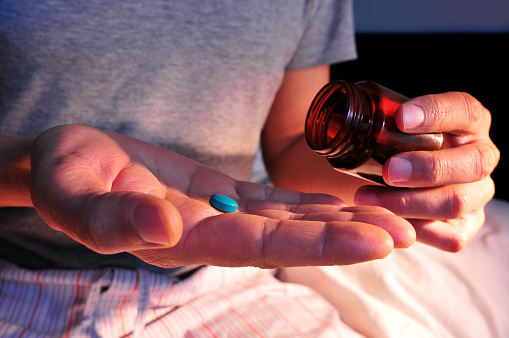-
Vania Modesto-Lowe, MD, MPH, Agata K. Harabasz, MD and Sophia A.
Walker, MD. Quetiapine for primary insomnia: Consider the risks.
Cleveland Clinic Journal of Medicine May 2021, 88 (5) 286-294;
DOI: https://doi.org/10.3949/ccjm.88a.20031
-
Sankaranarayanan J, Puumala SE. Antipsychotic use at adult
ambulatory care visits by patients with mental health disorders in
the United States, 1996-2003: national estimates and associated
factors. Clin Ther. 2007 Apr;29(4):723-41. doi:
10.1016/j.clinthera.2007.04.017. PMID: 17617297
-
Tassniyom K, Paholpak S, Tassniyom S, Kiewyoo J. Quetiapine for
primary insomnia: a double blind, randomized controlled trial. J Med
Assoc Thai 2010;93:729–34.
-
https://www.drugs.com/tips/seroquel-patient-tips
-
Catalano G, Grace JW, Catalano MC, Morales MJ, Cruse LM. Acute
akathisia associated with quetiapine use. Psychosomatics. 2005
Jul-Aug;46(4):291-301. doi: 10.1176/appi.psy.46.4.291. PMID:
16000672.
-
Juri C, Chaná P, Tapia J, Kunstmann C, Parrao T. Quetiapine for
insomnia in Parkinson disease: results from an open-label trial.
Clin Neuropharmacol. 2005 Jul-Aug;28(4):185-7. doi:
10.1097/01.wnf.0000174932.82134.e2. PMID: 16062098.
-
Pierre JM, Shnayder I, Wirshing DA, Wirshing WC. Intranasal
quetiapine abuse. Am J Psychiatry. 2004 Sep;161(9):1718. doi:
10.1176/appi.ajp.161.9.1718. PMID: 15337673.
-
Erdoğan S. Madde Kullanim Bozukluklarinda Ketiyapinin Yeri, Kötüye
Kullanim ve Bağimlilik Olasiliği: Bir Gözden Geçirme [Quetiapine in
substance use disorders, abuse and dependence possibility: a
review]. Turk Psikiyatri Derg. 2010 Summer;21(2):167-75. Turkish.
PMID: 20514567.
-
Wine JN, Sanda C, Caballero J. Effects of quetiapine on sleep in
nonpsychiatric and psychiatric conditions. Ann Pharmacother. 2009
Apr;43(4):707-13. doi: 10.1345/aph.1L320. Epub 2009 Mar 18. PMID:
19299326.






